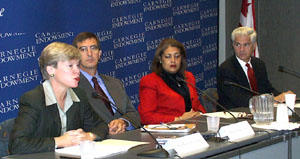Registration
You will receive an email confirming your registration.
In the wake of the Sept. 11 terrorist attacks on the United States and U.S. efforts to engage Pakistan in a response to those attacks, the Islamabad government has come under tremendous pressure from its opponents, some of them allied to the Taliban government of Afghanistan. If Gen. Pervez Musharraf's government collapses in the face of this pressure, Pakistan's nuclear complex might be subject to takeover from extremist Islamic forces.
SHIRIN TAHIR-KHELI, director, South Asia Program, Johns Hopkins School of Advanced International Studies, discussed the overall political and security environment in Pakistan, including the status of existing flashpoints such as Kashmir.
GEORGE PERKOVICH, director of the Secure World Program, the W. Alton Jones Foundation, and one of the most knowledgeable and respected U.S. experts on South Asia, talked about the politics, status and structure of the Pakistani nuclear program.
ROSE GOTTEMOELLER, Carnegie Endowment senior associate and former assistant secretary of energy for nonproliferation in the U.S. Dept. of Energy, described how techniques of threat reduction cooperation might apply in Pakistan.
JOSEPH CIRINCIONE, Carnegie Non-Proliferation Project director, moderated the event.
___________________________________________
Additional Resources:
